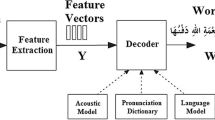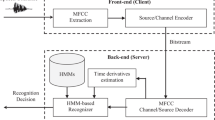Abstract
This paper deals with speaker-independent Automatic Speech Recognition (ASR) system for continuous speech. This ASR system has been developed for Modern Standard Arabic (MSA) using recordings of six regions taken from ALGerian Arabic Speech Database (ALGASD), and has been designed by using Hidden Markov Models.
The main purpose of this study is to investigate the effect of regional accent on speech recognition rates. First, the experiment assessed the general performance of the model for the data speech of six regions, details of the recognition results are performed to observe the deterioration of the performance of the ASR according to the regional variation included in the speech material. The results have shown that the ASR performance is clearly impacted by the regional accents of the speakers.



Similar content being viewed by others
References
Alotaibi, Y. A., Selouani, S. A., & O’Shaughnessy, D. (2008). Experiments on automatic recognition of non-native Arabic speech. EURASIP Journal on Audio Speech and Music Processing, 2008, 679831. 9 pages, doi:10.1155/2008/679831
Benzeghiba, M., De Mori, R., Deroo, O., Dupont, S., Erbes, T., Jouvet, D., Fissore, L., Laface, P., Mertins, A., Ris, C., Rose, R., Tyagi, V., & Wellekens, C. (2007). Automatic speech recognition and speech variability: a review. Speech Communication, 49(10–11), 763–786.
Droua-Hamdani, G., Selouani, S. A., & Boudraa, M. (2010). Algerian Arabic speech database (ALGASD): corpus design and automatic speech recognition application. Arabian Journal for Science and Engineering, 35(2C)(158), 157–166.
Elmahdy, M., Gruhn, R., Minker, W., & Abdennadher, S. (2009). Modern Standard Arabic based multilingual approach for dialectal Arabic speech recognition. In 8th international symposium on natural language processing. SNLP’09 (pp. 165–174).
Elshafei, M., Al-Muhtaseb, H., & Al-Ghamdi, M. (2008). Speaker-independent natural Arabic speech recognition system. In The international conference on intelligent systems ICIS 2008, Bahrain.
Huang, X., Acero, H. A., & Hon, H.-W. (2003). Spoken language processing. A guide to theory, algorithm and system development. Upper Saddle River: Microsoft Research, Prentice Hall.
Jelinek, F. (1999). Statistical methods for speech recognition (2nd ed.). Cambridge: MIT.
Linguistic Data Consortium (LDC). Catalog Number LDC2002S02, 2002. http://www.ldc.upenn.edu.
Rabiner, L., & Juang, B. H. (1993). Fundamentals of speech recognition. Englewood Cliffs: Prentice Hall.
Speech Assessment Methods Phonetic Alphabet (SAMPA): http://www.phon.ucl.ac.uk/home/sampa/arabic.htm.
Young, S., Evermann, G., Kershaw, D., Moore, G., Odell, J., Ollason, D., Valtchev, V., & Woodland, P. (2006). The HTK book (for HTK Version. 3.4). Cambridge University Engineering Department. http:///htk.eng.cam.ac.uk/prot-doc/ktkbook.pdf.
Vergyri, D., Kirchhoff, K., Duh, K., & Stolcke, A. (2004). Morphology-based language modeling for Arabic speech recognition. In Proceeding of ICSLP (pp. 2245–2248).
Watson, J. C. E. (2007). The phonology and morphology of Arabic. New York: Oxford University Press.
Author information
Authors and Affiliations
Corresponding author
Rights and permissions
About this article
Cite this article
Droua-Hamdani, G., Selouani, SA. & Boudraa, M. Speaker-independent ASR for Modern Standard Arabic: effect of regional accents. Int J Speech Technol 15, 487–493 (2012). https://doi.org/10.1007/s10772-012-9146-4
Received:
Accepted:
Published:
Issue Date:
DOI: https://doi.org/10.1007/s10772-012-9146-4




